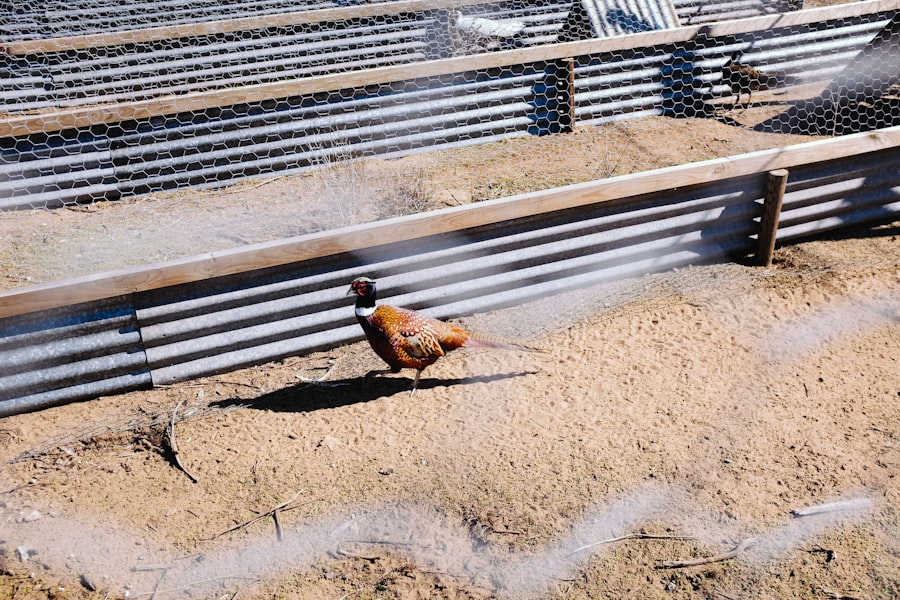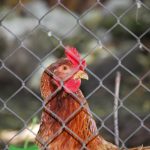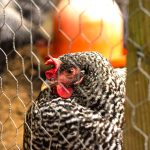Chickens are social creatures with innate foraging and exploratory behaviors. As prey animals, they remain vigilant for potential threats. Understanding these characteristics is essential for effective predator protection.
Chickens are most vulnerable during dawn and dusk when roosting or foraging. They are drawn to areas with dense vegetation for cover. This knowledge allows chicken keepers to identify high-risk areas on their property and implement appropriate protective measures.
Chickens naturally establish a hierarchical social structure known as the pecking order. This can result in bullying and aggression, particularly in confined spaces. Comprehending the pecking order dynamics enables owners to create a harmonious environment for their flock.
Providing adequate space, food, and water for all chickens helps minimize aggressive behavior and promotes peaceful coexistence within the group.
Table of Contents
- 1 Creating Physical Barriers
- 2 Implementing Natural Deterrents
- 3 Providing Alternative Spaces for Your Chickens
- 4 Using Repellents
- 5 Training Your Chickens
- 6 Seeking Professional Help
- 7 FAQs
- 7.1 What are some effective ways to keep chickens out of my garden?
- 7.2 What type of fencing is best for keeping chickens out of the garden?
- 7.3 What are some natural deterrents that can be used to keep chickens out of the garden?
- 7.4 How can I create physical barriers to keep chickens out of my garden?
- 7.5 Why is it important to provide alternative areas for chickens to roam?
Key Takeaways
- Chickens are social animals and their behavior can be influenced by their environment and interactions with other chickens.
- Physical barriers such as fences and netting can help keep chickens safe from predators.
- Natural deterrents like planting thorny bushes or using predator urine can discourage predators from approaching the chicken coop.
- Providing alternative spaces like hiding spots and perches can give chickens a sense of security and reduce stress.
- Repellents like motion-activated sprinklers or ultrasonic devices can help keep predators away from the chicken coop.
Creating Physical Barriers
Securing the Coop and Run
One of the most effective ways to protect your chickens from predators is by creating physical barriers around their coop and run. This can include installing fencing with buried wire mesh to prevent digging predators, such as foxes and raccoons, from gaining access to the coop. It’s important to ensure that the fencing is tall enough to prevent predators from jumping over it, and that there are no gaps or weak spots that predators can exploit.
Protecting from Aerial Predators
Adding a roof or cover to the chicken run can help protect your flock from aerial predators, such as hawks and owls. This physical barrier can prevent these predators from swooping down and attacking your chickens.
Additional Deterrents and Security Measures
Another physical barrier that can be effective in deterring predators is a motion-activated light or sound system. These devices can startle predators and deter them from approaching the coop or run. Additionally, installing predator-proof latches and locks on coop doors and windows can help prevent predators from gaining access to your chickens. By creating physical barriers, you can significantly reduce the risk of predator attacks and provide a safer environment for your flock.
Implementing Natural Deterrents
In addition to physical barriers, implementing natural deterrents can also help protect your chickens from predators. One effective natural deterrent is the presence of guardian animals, such as dogs or geese, that can help deter predators from approaching the coop or run. These animals have a natural instinct to protect their territory and can alert you to potential threats.
Additionally, planting thorny bushes or shrubs around the perimeter of the coop can create a natural barrier that deters predators from approaching. Another natural deterrent is the use of predator scent repellents, such as coyote or wolf urine, which can create the illusion that a predator is present in the area. This can deter smaller predators, such as raccoons and opossums, from approaching the coop or run.
Additionally, implementing natural deterrents such as motion-activated sprinklers or noise-making devices can startle predators and discourage them from approaching your chickens. By using natural deterrents, you can create a more secure environment for your flock and reduce the risk of predator attacks.
Providing Alternative Spaces for Your Chickens
To further protect your chickens from predators, providing alternative spaces for them to roam and forage can help reduce their vulnerability to attacks. Allowing your chickens access to a larger grazing area during the day can help reduce overcrowding in their coop or run and minimize stress within the flock. This can also help disperse the scent of your chickens, making it less likely for predators to locate them.
Additionally, providing hiding spots and shelters within the grazing area can give your chickens a safe place to retreat if they sense danger. This can include dense vegetation, brush piles, or small shelters that provide cover from aerial predators. By providing alternative spaces for your chickens to roam and seek shelter, you can help reduce their vulnerability to predator attacks and create a more natural and secure environment for your flock.
Using Repellents
In addition to natural deterrents, using repellents can also help protect your chickens from predators. There are a variety of commercial repellents available that are designed to deter specific types of predators, such as foxes, raccoons, or birds of prey. These repellents often use natural ingredients or scents that are unpleasant to predators, such as garlic or hot pepper, to discourage them from approaching the coop or run.
Another type of repellent that can be effective in deterring predators is electric fencing. This type of fencing delivers a mild electric shock to predators that come into contact with it, deterring them from attempting to breach the perimeter. Electric fencing can be particularly effective in deterring larger predators, such as coyotes or dogs, from approaching your chickens.
By using repellents, you can create an additional layer of protection for your flock and reduce the risk of predator attacks.
Training Your Chickens

Developing a Heightened Sense of Awareness
Training your chickens to recognize and respond to potential threats can also help protect them from predators. Chickens have a natural instinct to be wary of unfamiliar sounds and movements, so by exposing them to these stimuli in a controlled environment, you can help them develop a heightened sense of awareness. This can include playing recordings of predator calls or using decoys to simulate potential threats.
Teaching Your Chickens to Seek Shelter
Additionally, training your chickens to return to the safety of their coop or run at a specific signal or sound can help protect them from predator attacks. By consistently reinforcing this behavior through positive reinforcement, such as treats or praise, you can help ensure that your chickens will seek shelter when they sense danger.
Reducing Vulnerability to Predator Attacks
Training your chickens to recognize and respond to potential threats can help reduce their vulnerability to predator attacks and provide an added layer of protection for your flock.
Seeking Professional Help
If despite your best efforts, you continue to experience predator attacks on your flock, it may be necessary to seek professional help. A professional wildlife control expert can assess the specific threats to your chickens and recommend tailored solutions to protect them from predators. They may be able to identify specific weaknesses in your current predator deterrent measures and provide guidance on how to strengthen them.
Additionally, seeking professional help may involve installing more advanced predator deterrent systems, such as motion-activated cameras or alarms, that can help monitor and deter potential threats to your flock. A professional wildlife control expert may also be able to provide advice on habitat modification or other long-term strategies for reducing predator pressure on your property. By seeking professional help, you can gain valuable insights and expertise in protecting your flock from predators and ensure the safety and well-being of your chickens.
In conclusion, understanding the behavior of chickens is crucial in implementing effective predator deterrent measures. By creating physical barriers, implementing natural deterrents, providing alternative spaces for your chickens, using repellents, training your chickens, and seeking professional help when necessary, you can significantly reduce the risk of predator attacks on your flock. Protecting your chickens from predators requires a multi-faceted approach that takes into account their natural behaviors and vulnerabilities.
By implementing these strategies, you can create a safer and more secure environment for your flock and provide them with the protection they need to thrive.
If you’re struggling to keep your chickens out of your garden, you may want to consider renting a chicken coop. This article on poultrywizard.com offers valuable insights into how renting a coop can provide a designated space for your chickens, keeping them away from your garden and allowing you to better manage their behavior.
FAQs
What are some effective ways to keep chickens out of my garden?
Some effective ways to keep chickens out of your garden include using fencing, creating physical barriers, using natural deterrents, and providing alternative areas for the chickens to roam.
What type of fencing is best for keeping chickens out of the garden?
A sturdy wire or mesh fencing that is at least 4 feet tall and buried a few inches into the ground is best for keeping chickens out of the garden. This will prevent them from digging under the fence.
What are some natural deterrents that can be used to keep chickens out of the garden?
Natural deterrents such as citrus peels, coffee grounds, or cayenne pepper sprinkled around the garden can help deter chickens from entering the area.
How can I create physical barriers to keep chickens out of my garden?
You can create physical barriers by using row covers, cloches, or chicken wire to protect your garden from chickens. These barriers will prevent the chickens from accessing the plants.
Why is it important to provide alternative areas for chickens to roam?
Providing alternative areas for chickens to roam will help keep them away from the garden. This can include designated free-range areas, a chicken run, or providing entertainment and enrichment to keep them occupied elsewhere.
Meet Walter, the feathered-friend fanatic of Florida! Nestled in the sunshine state, Walter struts through life with his feathered companions, clucking his way to happiness. With a coop that’s fancier than a five-star hotel, he’s the Don Juan of the chicken world. When he’s not teaching his hens to do the cha-cha, you’ll find him in a heated debate with his prized rooster, Sir Clucks-a-Lot. Walter’s poultry passion is no yolk; he’s the sunny-side-up guy you never knew you needed in your flock of friends!







